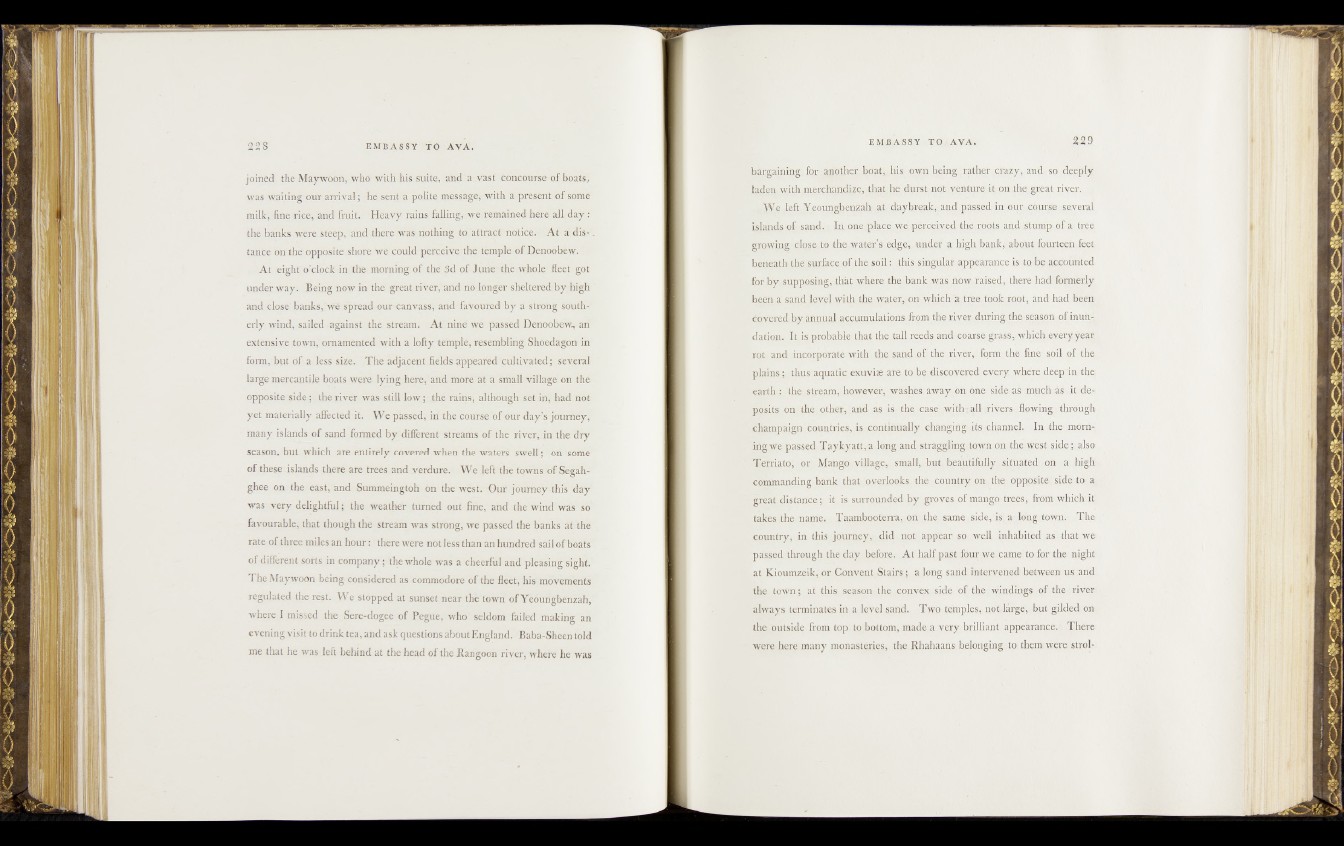
joined the Maywohn,-who5 with his suite, ahd’av ast' êoixPQurse of boats,
was waiting' oui- arrival; he" seift-a polite messages- with a present of some
milk, fine rice;, and fruit. Heavy rains falling, we remained here all--day:
the hanks were steep;'and there was nothing to attract notice. At a.distance
on the? opposite^hore we could-percnive the temple-of Denoobew.
At eight' o’clock in, the morning of the 3d o f June the whole .fleet got
under way. Being now in the great river,'and no longer sheltered by high
and .close' banks,'wé spread our canvass, and-favoured by a Strong southerly
wind', sailed against the stream. At nine we passed Denoobew, an
extensive town, ornamented with a lofty temple, resembling Shoedagon in
form, but óf a less size. 1 The adjacent fields appeared cultivated; several
large mercantile boats were lying here, and more at a small village on the
opposite side; the river was still low; the rains, although set in, had not
yet materially affected it. We passed, in the course of our day’s journey,
many islands of sand formed by different streams of the river,, in the dry
season, but which are entirely covered when the waters swell; oir-'soMe'
©f.these; islands there are trees andjverdure. We left the towns^oÊSeg'ah-
ghee on the east, and Summeingtoh ón the west. Our jaurneyjthlls day'
was very delightful; the weather turned out fine, and the wind was so
favourable, that though the stream was strong, we passed the banks at the
rate of three miles an h o u r: there were not less than an hundred sail of boats
of different softs in company; the whole was a cheerful and pleasing sight.
The Maywoon being considered as commodore of the fleet, his movements
regulated the rest. We stopped at sunset near the town of Yeoungbenzah,
where I missed the Sere-dogee .of Pegue, who seldom failed -making an
evening visit to drink tea, and ask questions about England. Baba-Sheen told
me that he was . left behind at the head of the Rangoon river, where he was
bargaining jifor jmothe^J)c|at|vfiiS; AjSfrjoeing (Esther y , and. sojtdedpfjf
hd.eu wuh.mcieli uich/e th it liC,dyi>st noj»,jqfliUre ungdaliL gie it, liy u
,.We left A^iiujggbopi/ifhi,at 'tl i,\ l|uea^,;ci;ul ,p issed nrfpqi-v<.'njnsc ci af
isja/iflsMfean.d.. 1 cujjupgrc e&jed tkaroots^md suimpofa; tp-.u
growing-.clflsesto the iv a tc ^ ^d g i.y u p d ii j ImJi b yik,q,iWia^|ijlti;ii.ii. Lll
berieuh tlu^suiiace ol tjie >od this siagul u ippc uajK’©bs\loJb©.g^ouihedi
fbr b'y- Sqpppsmg, that $?be£© .the; bank .was hf^vhacfe'fiarmeg^f
bpqh a sandjleyel with the,yrate) ^m^dw'h^a tree.toi^Lioptv amUiad been»
enycicd lc i^ ^ a ja p n ^ h om thniijei; dupim^ij^sei©itm^inurii|
«elation, ft is„prob iblc Uiar the i, flluqds,a'L^^ai,V'>li-ts^ uhieh^erfysea®
rot r&nd^,r)Oorprirate. with fyj$*soil JgfrllCj
plains sAtSqs-ciquatit exits ige ar©4o.be,,diy;<>> erecl-es^i^v hcu. d.eoje pivthu
c ai th : the sn cam, however, washc s,aw ay.qh.b.ne s-i 11 e,.as i on n ell a s < UX ol on
gpsi.ts pudihe. oihcjr,idnd as. isL the^cvsi th- jal l ;n \ t i s flowing) tlnougli»
champaign t mint) ies,;is-Gontinually ^hanging-a,^ l^nnef ,rn,^h.eyrnoiji^
ing w c passed '1 a) k v itt, a long and sti .igglmg^town .on i-lie.swi sh ydi^jjidso
hypnato or M mgo-$ tUage small but, be uUilulK ivduani.dq.on a iiiglij
eommanding bank that^o^eLkioks, tile .,(.ouniijy ©tit thq opposite, side io.,aj
great distance; it is suirounded by-groves yfiimingOjtNe^i fioui^v^tuiviit|
takes ,the,<name. Taamboot'erra, p^flr&jSame .si.de,- is^ci^fifi^r{jpra|^lift
epuntry, in this journey, did not appear so,well inhabitedlasifehat^ei
pasSecf through the day before. At' half pait;'four we-papae.tqriqf,'the nighe
at Kioumzcik. or Conxent,Stairs ;s.a long sand intu vened. between usi and
the town; at this season the convex.-side 'of the,windings ofithccriyaa
always teiminates in a level sand. Two temples, notfiargo-Jiut gilded« oru
the- outside fiom top to bottom, made a v u v brilliant appeal ana*© ri*ht,ie
were her© many monasteries, the Bhafiaap^.hqfonging^toitheinewhrei'strol